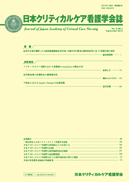Volume 13, Issue 1
Displaying 1-9 of 9 articles from this issue
- |<
- <
- 1
- >
- >|
-
2017 Volume 13 Issue 1 Pages 1-10
Published: March 31, 2017
Released on J-STAGE: April 19, 2017
Download PDF (1838K)
-
2017 Volume 13 Issue 1 Pages 11-17
Published: March 31, 2017
Released on J-STAGE: April 19, 2017
Download PDF (1384K) -
2017 Volume 13 Issue 1 Pages 19-29
Published: March 31, 2017
Released on J-STAGE: April 19, 2017
Download PDF (1532K) -
2017 Volume 13 Issue 1 Pages 31-36
Published: March 31, 2017
Released on J-STAGE: April 19, 2017
Download PDF (1202K)
-
2017 Volume 13 Issue 1 Pages 37-48
Published: March 31, 2017
Released on J-STAGE: April 19, 2017
Download PDF (1134K) -
2017 Volume 13 Issue 1 Pages 49-57
Published: March 31, 2017
Released on J-STAGE: April 19, 2017
Download PDF (1290K)
-
2017 Volume 13 Issue 1 Pages 59-64
Published: March 31, 2017
Released on J-STAGE: April 19, 2017
Download PDF (3632K)
-
2017 Volume 13 Issue 1 Pages 65-70
Published: March 31, 2017
Released on J-STAGE: April 19, 2017
Download PDF (1286K)
-
2017 Volume 13 Issue 1 Pages 71-76
Published: March 31, 2017
Released on J-STAGE: April 19, 2017
Download PDF (1336K)
- |<
- <
- 1
- >
- >|
